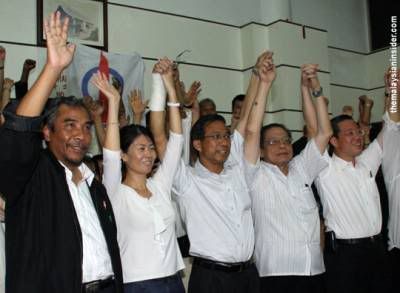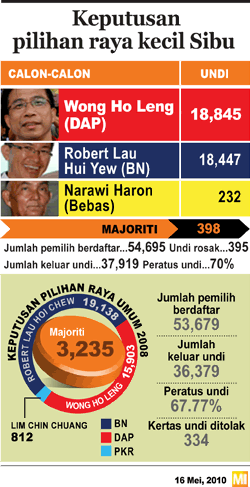
Despite the win in Sibu, Pakatan Rakyat still faces a tough road ahead

DAP’s Sibu win does not mean Pakatan Rakyat can soon win Putrajaya or Petrajaya, but it also shows that Barisan Nasional’s use of the chequebook will no longer impress disgruntled voters.
Wong Ho Leng’s slim 398 vote majority win revealed DAP’s smart use of issues and disenchantment among the Chinese and Christians, which the Najib administration could not solve simply with grants and promises of better times if the Barisan Nasional (BN) candidate gets elected.
But it also illustrated that DAP and Pakatan Rakyat’s (PR) appeal did not go beyond those communities to the key Melanau/Iban demographic, who stuck to BN and some of whom called DAP ally, PKR, troublemakers.
Just like in the Malay peninsula, PR’s outreach to the dominant communities was only limited to urban areas, and not rural areas which have more Parliamentary and state seats.
“We didn’t get the Iban vote, it’s very close then,” a senior DAP leader told The Malaysian Insider in the tense hours leading to the announcement of official results for the Sibu by-election.
The lack of appeal to rural communities will hamper PR’s quest to capture Sarawak and replace long-serving Sarawak Chief Minister Tan Sri Abdul Taib Mahmud in state administrative capital, Petrajaya.
The biggest upset was for BN, which stuck to its playbook of development politics by wielding its chequebook to solve issues that had festered under five-term Sibu MP, the late Datuk Robert Lau Hoi Chew, similar to Hulu Selangor which had a laundry list of issues unresolved by four-term MP Datuk G. Palanivel.
Unlike last month’s Hulu Selangor parliamentary by-election which it won narrowly, BN lost Sibu and dented the image of Sabah and Sarawak being its “fixed deposit” in general elections. Both states provided 54 of the 137 seats won by BN in Election 2008, in its worst-ever electoral outing.
BN had expected to win Sibu, as it did Hulu Selangor, by putting a younger candidate backed by the resources of the ruling federal government to almost instantly fulfil the needs of the voters.
Anecdotal evidence showed BN spent up to RM170 million in Hulu Selangor and over RM20 million for Sibu, including unprecedented special grants totalling RM1.75 million to four Methodist churches.
Was it to counter DAP’s strategy of using the “Allah” row or news that the Home Ministry had told the Bible Society of Malaysia last March that it intended to destroy 5,000 copies of the Malay-language bible Al-Kitab?
Sunday’s by-election results have yet to be fully analysed to see if the grants swayed votes to BN, but data from DAP showed voters in Rajang Park snubbed the prime minister’s promise of RM5 million to alleviate floods if SUPP’s Robert Lau Hui Yew won the seat.
The Sibu by-election also showed that Datuk Seri Najib Razak has to stick to his 1 Malaysia mantra of “People First. Performance Now” by resolving issues immediately instead of hoping time will cure them.
Letting the courts refrain from deliberating the “Allah” issue only prolongs the matter and the sense that Christians are not getting equal treatment under the law. Promising to help the Chinese to permanently prevent floods or get them new schools during an election campaign shows they are only seen as vote-banks and nothing more.
This will be the prime minister’s worry as Sarawak will have to hold state elections by July 2011, and long-standing issues have to be resolved if BN does not want to lose the country’s biggest state to PR.
Some saw the Sibu vote as a referendum on the powerful Abdul Taib who has been at the helm since 1981. His absence in the Sibu campaign was noticeable but did not help the coalition retain the seat.
While DAP crows over its closely-fought win in its first by-election since Election 2008 and share the experience with its weaker ally PKR, which has lost six MPs, Najib will have to work hard on delivering economic progress similar to the 2010’s first quarter growth of 10.1 per cent to impress the voters.


